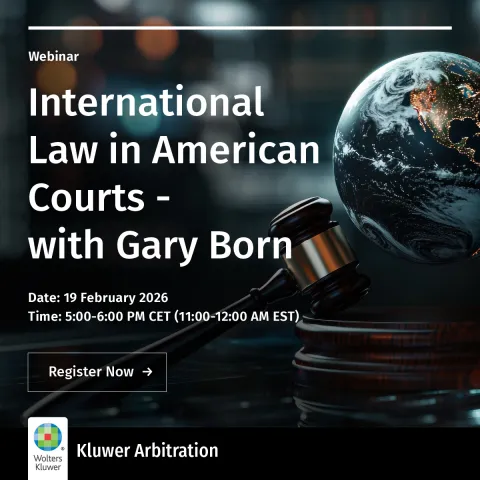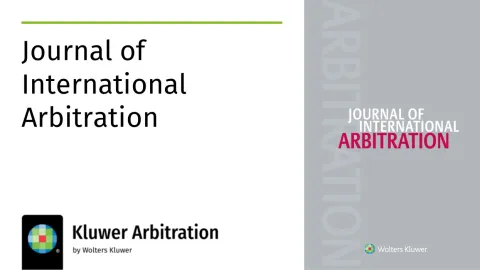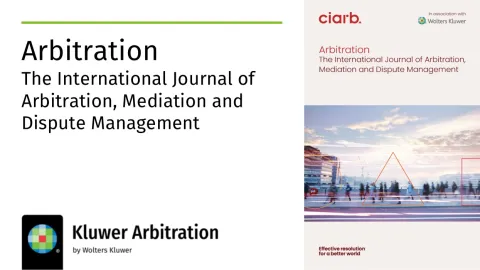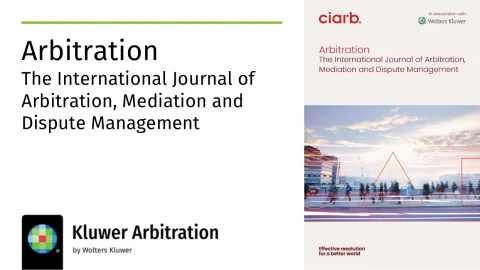The Corruption Defense: Practical Considerations for Claimants
January 22, 2019
In recent years, a number of arbitral tribunals adjudicating treaty-based investment disputes have been confronted with the question of what to do when the state party to such a dispute alleges that the investors acquired the investment through corrupt means. In some instances, tribunals have applied the defense as a jurisdictional bar, preventing the investors accused of corrupt acts from even presenting the merits of their case to the arbitral body. In other matters, the tribunals have found that the accusations speak more to the merits rather than jurisdiction. As a consequence, the law is far from settled and attorneys litigating this issue operate in largely uncharted terrain. Beyond the legal uncertainties, investors and attorneys faced with accusations of corruption are often faced with a domino effect of unexpected consequences, including parallel criminal proceedings and related civil proceedings. This has made the “corruption defense,” as it is known, a serious hurdle for investors and their lawyers. This article looks to past experience in order to offer a way forward for lawyers and clients confronting accusations of corruption in the course of arbitration.
The Current State of the Defense
The 1963 award by Judge Gunnar Lagergren in ICC Case No. 1110 is widely cited as lending credence to the corruption defense in the international arbitration context. In that case, Judge Lagergren, the sole arbitrator, declined jurisdiction of a dispute between a British corporation and an Argentinian engineer whom the corporation had contracted with solely in the hopes of benefitting from his government connections in Argentina. In his opinion, Judge Lagergren stated that the parties had “forfeited any right to ask for assistance of the machinery of justice,” when they entered into the contract that involved “gross violations of good moral and international public policy.”
Several decades later, the logic of Judge Lagergren’s opinion began to be followed in the context of investor-state contractual disputes. In the well-known World Duty Free v. Republic of Kenya arbitration, investors brought a claim against Kenya for its expropriation of their duty-free stores. During the course of the arbitration, evidence was presented revealing that World Duty Free had donated $2 million to the Kenyan president’s reelection campaign in order to obtain contracts with the Kenyan government. After canvassing various sources of law, the tribunal concluded that bribery is contrary to public order and a basis for declining to consider contractual claims based on corruption.1 The tribunal then found that World Duty Free was not entitled to maintain its action against Kenya and decided in favor of the state.
Tribunals adjudicating treaty-based claims have since cited the international public policy against corruption but generally not relied upon it to dismiss investor’s claims. For example, in an early award on the issue, Wena Hotels Ltd. v. Arab Republic of Egypt, the tribunal acknowledged that corruption alleged by Egypt was generally against international bones mores. Nonetheless, the tribunal observed that Egypt had not provided evidence concerning the alleged corruption. Crediting the evidence in support of the contract’s legitimacy, the tribunal was unwilling to absolve Egypt of liability.
Recent tribunals adjudicating investor-state disputes have instead preferred to focus on the provisions of the particular investment treaty giving rise to a claim in ruling upon a corruption defense. In the oft-cited case of Metal-Tech Ltd. v. Republic of Uzbekistan, the tribunal focused on the Israel-Uzbekistan BIT in applying the corruption defense as a jurisdictional bar. In that matter, Metal-Tech Ltd., an Israeli company, initiated arbitration proceedings claiming that Uzbekistan had breached the relevant BIT and Uzbek laws by expropriating Metal-Tech’s property without due process, amongst other claims. The tribunal focused on the applicable BIT’s requirement that arbitration of disputes “concern[] an investment,” defined as “any kind of assets, implemented in accordance with the laws and regulations of the Contracting Party in whose territory the investment is made…” The tribunal concluded that since corruption occurred in the establishment of the joint venture and the joint venture was not in compliance with the law when it was established, it did not fall under the definition of an “investment” under the applicable BIT and therefore the tribunal had no jurisdiction over the dispute.
In Kim v. Uzbekistan, the tribunal similarly focused on the text of the Uzbekistan - Kazakhstan BIT. In contrast to the Metal-Tech tribunal, the arbitrators found that the defense could not be used as a jurisdictional bar, though it might be a factor at the merits stage. Specifically, the tribunal issued a decision on jurisdiction that asserted its ability to decide the case on its merits, even though the corruption defense was raised. In that case, a private equity group from Kazakhstan submitted a dispute under the relevant BIT after the Uzbekistan government interfered in its investment in two cement plants in Uzbekistan.
The existing inconsistency in this area of law creates significant opportunities and risks for investors and their counsel. The applicability of the corruption defense in published awards has almost exclusively turned entirely on the investor’s conduct—irrespective of the behavior of the state invoking it. This means that an investor’s claim may be dismissed under existing jurisprudence, even when the state has otherwise engaged in serious breaches of its international obligations to foreign investors. Moreover, there has been no consensus as to the evidentiary showing that a state is required to make to establish a successful corruption defense.2 More significantly, there is still considerable uncertainty as to what payments, etc. by an investor will be deemed corrupt acts.3
Practical Considerations
The possibility of facing a corruption defense requires a degree of introspection at the outset of a dispute on the part of investors. When a multinational company is operating in a jurisdiction with a high level of perceived corruption, any decision to arbitrate should be made after outside counsel has consulted with the compliance department. That is because even minor payments could be construed as attempts at bribery. Moreover, although the corruption defense has largely been limited to allegations of corruption in the context of making an investment, any conceivably illicit payment that occurred after the investment was made will need to be considered, since a tribunal could always find that corruption in maintaining an investment is against international public norms or in violation of an investment treaty’s text.
If an internal review exposes potential payments to a public functionary, or to individuals and companies with strong ties to the state, the safer, less expensive path may be to reach a negotiated resolution rather than proceed to a full-blown arbitration. While there are arguments that an investor can make in pursuing an arbitration (e.g., that a state is estopped from pursing a defense,4 that a state is contributorily at fault,5 or that the defense should only affect how damages are apportioned through a comparative fault regime), the mere allegation of corruption can create significant problems. Negative headlines can hurt or embarrass the investor; and government agencies can catch wind of the issue and launch a parallel criminal investigation, further complicating the arbitral proceeding. There may be a tension, for example, between the need to answer questions as part of the arbitral proceeding, and the privilege against self-incrimination in the parallel criminal proceeding.
More troubling still, a parallel criminal proceeding can expose investors to governments’ vast arsenal of investigative tools – a more invasive form of discovery than they would otherwise be exposed to. In the United States, for example, prosecutors can subpoena bank records, execute search warrants, and conduct surveillance – all in secret. And if the criminal investigation reveals new information, the process can become a vicious circle: arbitration leads to a criminal probe, which can in turn reinforce defenses in the arbitration, and even launch new civil actions against the investor, including shareholder securities litigation.
For lawyers, the corruption defense poses unique challenges. Should an investor face a parallel criminal proceeding, the tension between the criminal and arbitral proceedings may be difficult to manage. Asking that the tribunal to consider a comparative fault regime that also holds the state responsible, for example, might be considered a tacit admission in the criminal case that your client engaged in bribery.
Given the distinctive challenges posed by the corruption defense, it is particularly important for potentially at risk investors to ensure that they undertake diligence when evaluating a potential investment arbitration. The failure to do so may unnecessarily expose an investor to significant collateral risks.
- 1 The High Court of Kenya recently reinforced this decision by setting aside an arbitral award in favor of World Duty Free that, while arising from different grievances on the part of the Kenyan government, was rooted in the same corruption on the part of World Duty Free.
- 2 See, e.g., Vladislav Kim v. Republic of Uzbekistan, ICSID Case No. ARB/13/6, Decision on Jurisdiction, ¶ 377 (Mar. 8, 2017) (“The Tribunal observes that the international community and many nations have placed a high priority on combatting corruption and that it may be the case that the standard of proof is shifting in this area of law.”); compare EDF (Servs.) Ltd. v. Romania, ICSID Case No. ARB/05/13, Award, ¶ 221 (Oct. 8, 2009) (‘The seriousness of the accusation of corruption in the present case, considering that it involves officials at the highest level of the Romanian Government at the time, demands clear and convincing evidence.') with Metal-Tech Ltd. v. Republic of Uzbekistan, ICSID Case No. ARB/10/3, Award, ¶ 243 (Oct. 4, 2013) (“the Tribunal will determine on the basis of the evidence before it whether corruption has been established with reasonable certainty.”)
- 3 See, e.g., Vladislav Kim v. Republic of Uzbekistan, ICSID Case No. ARB/13/6, Decision on Jurisdiction, ¶¶ 548-553 (Mar. 8, 2017)
- 4 See, e.g., M, Reeder, State Corruption in ICSID BIT Arbitration: Can it be Estopped? (March 9, 2017)
- 5 See, e.g., Yarik Kryvoi, Bribery, Corruption, and Fraud in Investor-State Disputes: How Should Tribunals Approach Economic Crimes? (Aug. 10, 2018)










Alan Franklin
There is a further issue perhaps that need to be understood; With the huge amounts at stake in ISDS claims, it is not beyond the realm of the reasonable that the state will allege corruption, even when there is no evidence. Additionally, it is quite easy for a state to manufacture the corruption evidence by having one of their officials become "the fall guy" who admits taking a bribe. Virtually impossible for the company to show this is false. I have discussed this with lawyers who act for states, asking if this happens. Their answer is "we represent states who would not do that, but yes, lots of states would take that measure to protect themselves from huge awards."
Waldemar Walczak
Corruption - Knowledge - Perception, for proper uderstanding the essense of corruption practice http://www.academia.edu/37741482/Corruption_as_a_net_of_influences_links_and_connections